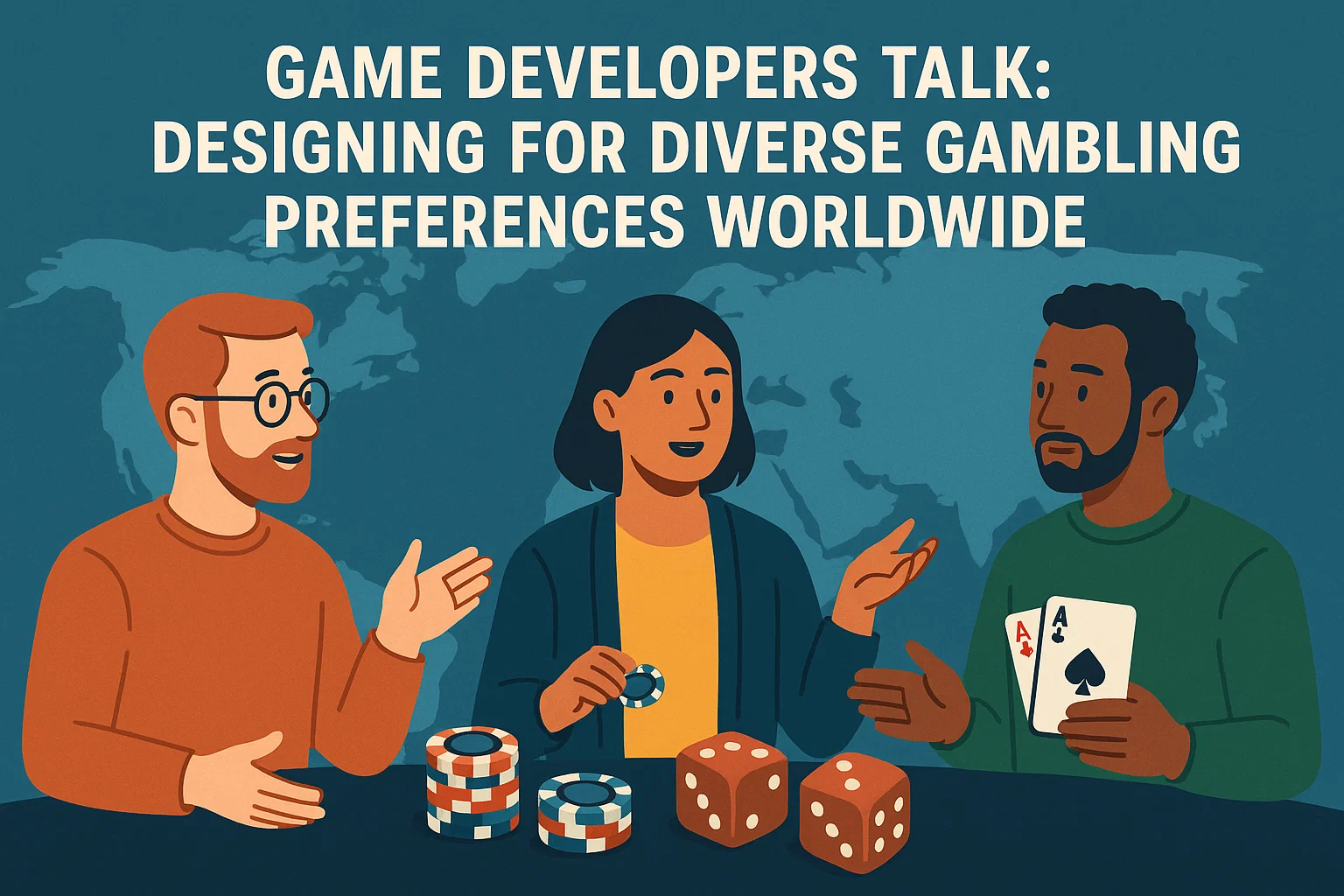Game Developers Talk: Designing for Diverse Gambling Preferences Worldwide

The global gambling industry stands at an unprecedented crossroads, with market projections reaching $754.78 billion by 2029 at a CAGR of 5.1%. This explosive growth has fundamentally transformed how game developers approach design, forcing a shift from universal solutions to highly sophisticated, culturally-nuanced gaming experiences that resonate with diverse player bases across continents.
According to the 2025 Game Developers Conference survey encompassing 3,500 developers from 86 countries, the challenges of creating gambling games for global audiences have become significantly more complex. Developers are no longer simply translating content—they’re reconstructing entire gaming experiences to align with regional preferences, regulatory frameworks, and cultural sensitivities.
The Globalization Challenge: Beyond Translation
Market Fragmentation Drives Innovation
The online gambling market, projected to reach $186.58 billion by 2029 with a remarkable 12.3% CAGR, presents both opportunities and complexities that traditional game development hasn’t previously encountered. Modern casino game developers must navigate a landscape where European players prioritize live dealer experiences, Asian markets demand mobile-first solutions, and emerging markets like Brazil focus heavily on sports betting over traditional casino games.
Regional Revenue Distribution by Gaming Type: • Europe: 51% casino games, 73% mobile usage, 65% utilizing responsible gaming tools • United States: 80% slot machine preference, $905.6M monthly online casino revenue • Asia-Pacific: 60% mobile transaction dominance, crash games surging among Gen Z • Brazil: 27% casino games versus 73% sports betting focus
Cultural Adaptation: The New Development Paradigm
Leading development companies have abandoned the one-size-fits-all approach in favor of what industry experts term “hyper-localization.” This strategy extends far beyond language translation to encompass cultural symbols, gameplay mechanics, and even mathematical models that align with regional luck concepts.
As revealed in recent developer interviews, successful localization requires understanding that the number 8 carries profound significance in Chinese markets, while Celtic imagery resonates strongly with Irish players. These seemingly decorative elements actually drive engagement, with research indicating that players experience heightened emotional connection when encountering culturally familiar symbols.
Technology as the Enabler: AI and Personalization
Artificial Intelligence Transforms Player Experience
The integration of AI and machine learning has revolutionized how developers approach diverse player preferences. According to industry data, 21% of operators currently utilize personalized customer experiences, while 18% have implemented AI-driven player interaction systems. These technologies enable real-time adaptation to regional preferences without requiring separate game versions.
Key AI Applications in Global Game Development:
- Real-time behavior analysis for cultural preference detection
- Dynamic content adaptation based on geographic location
- Personalized bonus mechanics aligned with local gambling traditions
- Anti-fraud systems calibrated for regional risk patterns
Evolution Gaming’s success with localized live dealer solutions exemplifies this trend. Their platforms now feature region-specific dealers, time zone optimization, and culturally appropriate interaction styles, resulting in significantly higher engagement rates across diverse markets.
Cross-Platform Development: Unity of Diversity
The modern development philosophy of “build once, play anywhere” has become essential for managing global complexity. Unity Engine, utilized by over 70% of new mobile casino games, enables developers to create culturally adaptive experiences without multiplying development costs exponentially.
This technological approach allows for modular cultural components that can be dynamically loaded based on player location, creating seamless experiences that feel natively designed for each market while maintaining centralized game logic and security protocols.
Regional Insights: Developer Perspectives
European Markets: Sophistication and Regulation
European developers emphasize the increasing sophistication of their player base, particularly regarding responsible gaming features. With 58% of European online gambling revenue now originating from mobile devices, developers must balance advanced gameplay with stringent regulatory compliance.
The Nordic region presents a particularly interesting case study, where 70% of top-played games in Finland feature Scandinavian themes. This cultural resonance directly translates to business performance, with Nordic-themed games achieving 15-20% higher retention rates compared to generic alternatives.
Asia-Pacific: Mobile Innovation Hub
The Asia-Pacific region’s dominance in mobile gaming innovation has profoundly influenced global gambling game development. With smartphone penetration expected to reach 2.8 billion users in 2025, developers are pioneering mobile-first experiences that prioritize quick loading, efficient data usage, and integration with local payment ecosystems.
Asian Market Innovations: • Integration of traditional games (baccarat, mahjong) with modern interfaces • Crash games incorporating social interaction layers • Localized payment system integration (mobile wallets, cryptocurrency) • Cultural calendar integration for promotional timing
Emerging Markets: The Next Frontier
Latin American markets, particularly Brazil, represent significant growth opportunities with unique requirements. The region’s preference for sports betting over traditional casino games has prompted developers to create hybrid experiences that blend traditional casino mechanics with sports-oriented themes and social features.
Developers working in these markets emphasize the importance of understanding local payment preferences, with Brazil’s Pix system and Mexico’s preference for cash-based transactions requiring specialized integration approaches.
Technical Challenges and Solutions
Regulatory Compliance Automation
Managing diverse regulatory requirements across 220+ jurisdictions has become a significant technical challenge. Leading development companies are implementing automated compliance systems that can adapt game features, promotional mechanics, and responsible gaming tools based on player location and local regulations.
Compliance Technology Stack:
- Geolocation-based feature activation/deactivation
- Automated age verification systems adapted to local requirements
- Dynamic responsible gaming tool deployment
- Real-time regulatory update integration
Localization Beyond Language
Modern casino game localization encompasses far more than linguistic adaptation. Developers must consider mathematical preferences (European versus American roulette odds), visual design preferences (minimalist Scandinavian versus vibrant Latin American aesthetics), and gameplay timing preferences that align with cultural work and leisure patterns.
Advanced development frameworks now include cultural preference engines that can modify game pacing, bonus frequency, and visual elements based on aggregated regional player data, creating experiences that feel intuitively familiar to local players.
Economic Implications and Market Dynamics
Development Cost Evolution
The shift toward culturally adaptive design has fundamentally altered development economics. While initial development costs have increased by an estimated 40-60% due to localization requirements, the revenue potential from properly adapted games significantly outweighs these investments.
Cost-Benefit Analysis: • Initial development cost increase: 40-60% • Player retention improvement in localized markets: 25-35% • Revenue per user increase in target regions: 30-45% • Market penetration acceleration: 50-70% faster adoption
Investment Trends and Future Outlook
The casino gaming development market, valued at $77.2 billion in 2024 and projected to reach $107 billion by 2030, is increasingly prioritizing companies with demonstrated cultural adaptation capabilities. Investment is flowing toward developers who can prove their ability to successfully navigate diverse global requirements.
Blockchain integration represents another significant investment area, with 14% of European gaming leaders actively exploring cryptocurrency and NFT integration to appeal to tech-savvy global audiences while providing transparent, culturally-neutral gaming mechanics.
The Human Element: Developer Insights
Cultural Consultation Networks
Leading development studios have established networks of cultural consultants who provide ongoing guidance throughout the development process. These collaborations ensure that games don’t merely avoid cultural missteps but actively embrace local gaming traditions and preferences.
Successful developers report that this human-centered approach to cultural adaptation has become as important as technical capabilities in determining market success. The investment in cultural expertise typically pays dividends through improved player acquisition and retention metrics.
Player Feedback Integration
Modern development processes increasingly emphasize real-time player feedback integration, particularly for cultural adaptation. Developers utilize sophisticated analytics to monitor engagement patterns across different regions, allowing for rapid iteration and optimization of cultural elements.
This data-driven approach to cultural adaptation enables developers to identify successful cultural elements and replicate them across similar markets, creating efficiency gains while maintaining cultural authenticity.
Technology Trends Shaping the Future
Virtual Reality and Immersive Experiences
VR technology integration is creating new opportunities for cultural adaptation, allowing developers to create virtual casino environments that reflect architectural and atmospheric preferences from different regions. Early implementations show promising engagement metrics, particularly in markets where physical casino access is limited.
Blockchain and Transparency
Cryptocurrency integration addresses cultural concerns about gaming fairness while providing payment solutions for regions with limited traditional banking infrastructure. This technology is particularly valuable in emerging markets where traditional payment systems may be less accessible or trusted.
Social Gaming Integration
The increasing importance of social elements in gambling games reflects global trends toward community-oriented gaming experiences. Developers are creating sophisticated social systems that can adapt to different cultural approaches to community interaction and competition.
Future Outlook: Strategic Implications
Market Consolidation and Specialization
The complexity of global market adaptation is driving industry consolidation, with larger development companies acquiring regional specialists to enhance their cultural adaptation capabilities. This trend is creating opportunities for developers with deep regional expertise while challenging those who cannot adapt to global requirements.
Regulatory Harmonization Potential
While current regulatory diversity creates development challenges, emerging international cooperation frameworks may eventually simplify cross-border game deployment. Developers are preparing for potential regulatory harmonization while maintaining flexibility for current market requirements.
Technology Integration Acceleration
The convergence of AI, blockchain, and cultural adaptation technologies is accelerating, creating opportunities for developers who can successfully integrate these capabilities. The competitive advantage increasingly belongs to teams that can combine technical innovation with deep cultural understanding.
Conclusion: The Cultural-Technical Synthesis
The future of gambling game development lies in the successful synthesis of advanced technology with nuanced cultural understanding. Developers who master this combination are positioned to capitalize on the industry’s continued growth while creating meaningful, engaging experiences for players worldwide.
The transformation from universal to culturally adaptive gaming represents more than a tactical shift—it reflects a fundamental evolution in how the industry understands and serves its global audience. Success in this environment requires not just technical proficiency but cultural intelligence, regulatory agility, and the ability to balance global scalability with local authenticity.
As the global gambling market continues its expansion toward nearly $755 billion by 2029, the developers who thrive will be those who view cultural diversity not as a challenge to overcome but as an opportunity to create richer, more engaging gaming experiences that resonate with players across all markets and cultures.
The integration of technology and cultural sensitivity has become the defining characteristic of successful modern gambling game development, creating unprecedented opportunities for developers who can navigate this complex but rewarding landscape.
This analysis is based on current market data and developer surveys as of 2025. The rapidly evolving nature of both technology and cultural preferences requires continuous monitoring and adaptation of development strategies.
